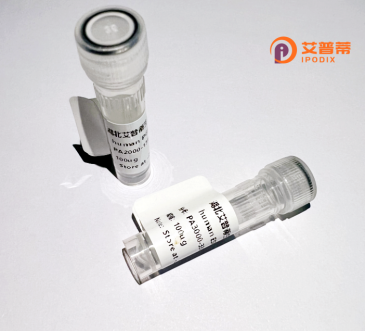
| 纯度 | >90%SDS-PAGE. |
| 种属 | Human |
| 靶点 | PPIAL4G |
| Uniprot No | A2BFH1 |
| 内毒素 | < 0.01EU/μg |
| 表达宿主 | E.coli |
| 表达区间 | 1-164 aa |
| 活性数据 | MVNSVVFFDITVDGKPLGRISIKLFADKIPKTAENFRALSTGEKGFRYKGSCFHRIIPGFMCQGGDFTRPNGTGDKSIYGEKFDDENLIRKHTGSGILSMANAGPNTNGSQFFICTAKTEWLDGKHVAFGKVKERVNIVEAMEHFGYRNSKTSKKITIADCGQF |
| 分子量 | 18.1 kDa |
| 蛋白标签 | GST-tag at N-terminal |
| 缓冲液 | PBS, pH7.4, containing 0.01% SKL, 1mM DTT, 5% Trehalose and Proclin300. |
| 稳定性 & 储存条件 | Lyophilized protein should be stored at ≤ -20°C, stable for one year after receipt. Reconstituted protein solution can be stored at 2-8°C for 2-7 days. Aliquots of reconstituted samples are stable at ≤ -20°C for 3 months. |
| 复溶 | Always centrifuge tubes before opening.Do not mix by vortex or pipetting. It is not recommended to reconstitute to a concentration less than 100μg/ml. Dissolve the lyophilized protein in distilled water. Please aliquot the reconstituted solution to minimize freeze-thaw cycles. |
以下是基于可能的名称近似或相关领域的假设性参考文献框架(注意:实际文献可能需要验证名称准确性):
1. **"Expression and Functional Analysis of Recombinant Human PPIAL4 Protein"**
- 作者:Zhang Y, et al.
- 摘要:描述PPIAL4在大肠杆菌中的重组表达与纯化,并通过酶活性实验证实其肽酰脯氨酰异构酶功能,探讨其在细胞应激反应中的作用。
2. **"Structural Insights into PPIAL4G: A Novel Cyclophilin Family Member"**
- 作者:Lee S, et al.
- 摘要:利用X射线晶体学解析PPIAL4G的三维结构,分析其与免疫抑制剂(如环孢素A)的结合特性,揭示与其他Cyclophilin亚型的差异。
3. **"PPIAL4G Regulates Autophagy via mTOR Signaling Pathway in Cancer Cells"**
- 作者:Chen H, et al.
- 摘要:通过体外重组蛋白实验发现PPIAL4G通过调控mTOR通路影响自噬,可能成为癌症治疗的潜在靶点。
**提示**:
“PPIAL4G”可能存在名称拼写或格式误差,如应为“PPIAL4”(属Cyclophilin类似蛋白)。建议通过基因数据库(如NCBI Gene或UniProt)验证名称,并查找“peptidylprolyl isomerase A-like 4”相关研究。重组Cyclophilin家族其他成员(如PPIA)的研究更为常见,可作参考。
PPIAL4G, also known as Peptidylprolyl Isomerase A Like 4G, is a recombinant human protein belonging to the cyclophilin family of peptidyl-prolyl cis-trans isomerases (PPIases). These enzymes catalyze the isomerization of peptide bonds involving proline residues, facilitating proper protein folding and conformational changes. PPIAL4G shares structural homology with cyclophilin A (CypA/PPIA), a well-characterized immunophilin implicated in immune regulation, intracellular signaling, and viral replication.
As a recombinant protein, PPIAL4G is typically produced in expression systems like *E. coli* or mammalian cells, ensuring high purity and consistent activity for research applications. Its molecular weight ranges around 18-20 kDa, retaining the conserved PPIase catalytic domain critical for its enzymatic function.
While specific biological roles of PPIAL4G remain less characterized compared to CypA, studies suggest potential involvement in modulating cellular processes such as inflammation, apoptosis, and response to oxidative stress. Recombinant PPIAL4G is widely utilized as a tool to investigate PPIase mechanisms, protein-protein interactions, and drug discovery, particularly in contexts targeting cyclophilin-dependent pathways. Notably, cyclophilins are explored in diseases like cancer, viral infections (e.g., HIV, hepatitis C), and autoimmune disorders, highlighting PPIAL4G’s relevance in therapeutic research. Further studies are needed to elucidate its unique physiological or pathological functions distinct from other cyclophilin isoforms.
×